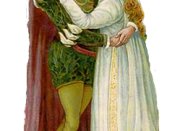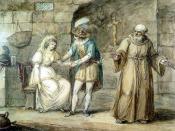Romeo and Juliet Essay
To express his view of good and evil in every man, William Shakespeare writes lines that Friar Laurence reveals in the tragedy of Romeo and Juliet which compare man to plants, focusing on the common trait they hold of having two contrasting components in their being. Throughout history, there has always been a conflict with the view of goodness and evilness in man. The philosopher Plato believed that man was born with a natural depravity and was basically an untrained animal who needed society's help to structure, educate, and fulfill his needs. On the other hand, Plato's pupil Aristotle believed that man is initially born with goodness and virtue. The issue of man's two sides can be thoroughly discussed over the gothic novel of Frankenstein by Mary Shelley. Some critics believe that the "creature" was prone to evil from the onset, that it was innately in his being, while others argue that the treatment the "creature" received from humans pitted him against mankind into an evil and revengeful state.
Shakespeare, however, in his extended metaphor comparing man to plants, holds the opinion that there is both decency and infamy in man. His opinion can be compared to the story of Dr. Jekyll and Mr. Hyde by Robert Louis Stevenson, where Dr. Jekyll is innately pure and kind but because he tries to hide the malicious side of his being, it eventually overcomes him completely. Shakespeare wishes to address the idea that evil can destroy a person and overtake them if it is let in and uses his lines of Friar Laurence as an aphorism and a warning to mankind.
The following lines from Shakespeare's Romeo and Juliet fully portray the author's view of a split of innocence and corruption in man, and the thought that evil...


